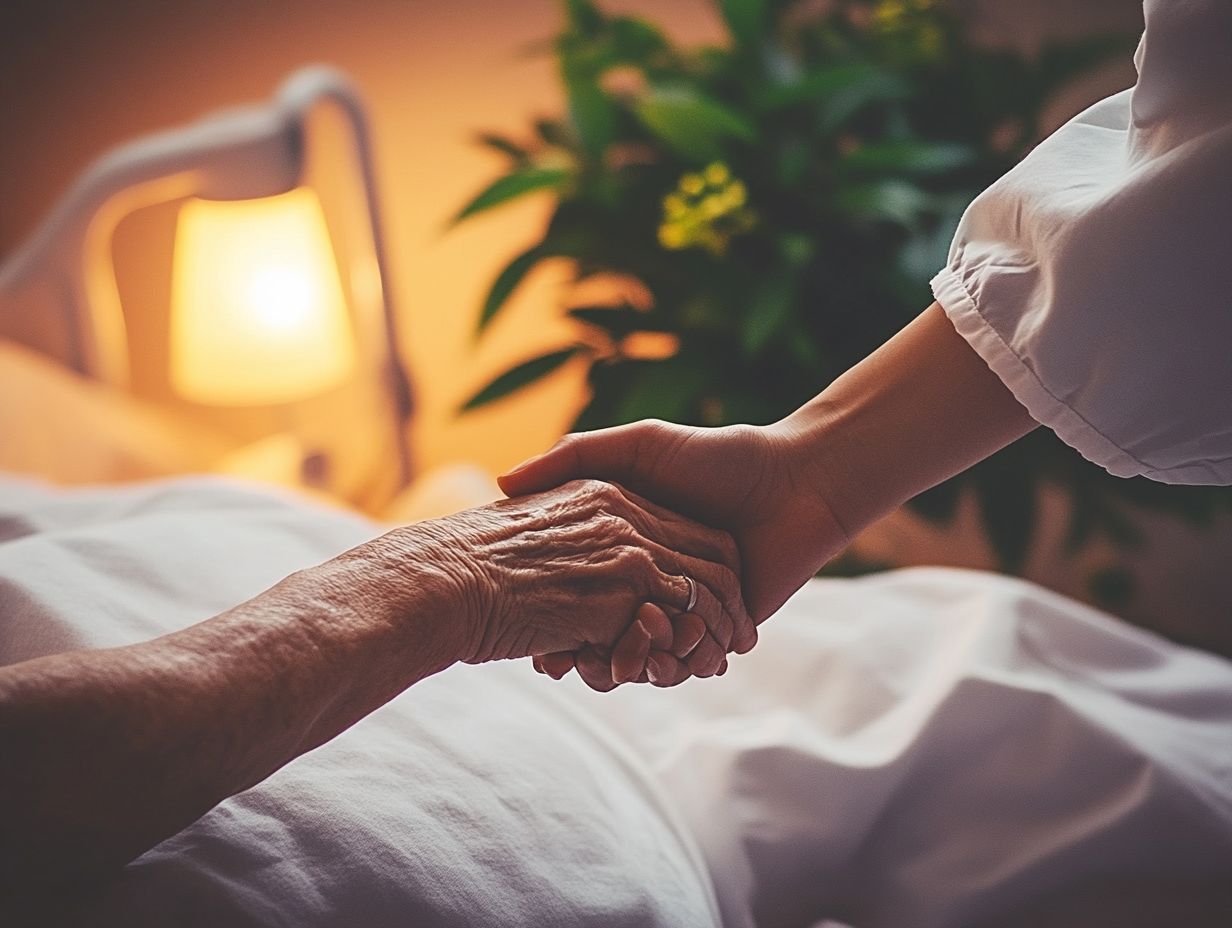Being a cancer caregiver presents numerous emotional challenges, impacting mental health and well-being. Caregivers experience significant caregiver burden as they face the daunting task of managing not only the physical demands of caregiving but also the emotional turmoil that accompanies a cancer diagnosis.
Key Emotional Challenges:
- Dealing with the Diagnosis: Caregivers experience significant stress severity when confronting a cancer diagnosis, necessitating effective coping strategies and psychosocial support systems to maintain mental health.
- Coping with Fear and Anxiety: Caregivers often grapple with fear and anxiety, requiring effective emotional coping mechanisms like mindfulness and social support groups to alleviate emotional distress.
- Balancing Responsibilities: Juggling caregiving with personal and professional duties demands robust time management and self-care practices to improve caregiver quality of life and mental well-being.
- Feeling Overwhelmed: The risk of burnout looms large, making it crucial for caregivers to engage in self-care and seek external caregiver support to preserve their well-being.
- Managing Communication and Boundaries: Effective communication and boundary setting are vital to prevent emotional exhaustion and maintain healthy relational dynamics.
Understanding these caregiving challenges and accessing the right resources can empower caregivers to navigate their roles more effectively, ensuring they take care of both their loved ones and themselves.
Key Takeaways:
1. Dealing with the Diagnosis

Dealing with a cancer diagnosis involves managing emotional distress for both patients and their family caregivers.
Family caregivers face unique stressors that impact their mental health, psychological strain, and coping strategies.
Effective coping strategies and robust support systems are essential to mitigate stress severity and enhance emotional well-being.
Open communication, community resources, and self-care practices improve mental health and caregiver-patient relationships.
2. Coping with Fear and Anxiety
Coping with fear and anxiety is crucial for family caregivers of cancer patients, who often face emotional distress and psychological health challenges.
Effective coping mechanisms include:
- Regular physical exercise
- Mindfulness practices
- Sufficient rest
Engaging in support groups or reaching out to friends and family provides essential emotional support and reduces feelings of isolation.
3. Balancing Caregiving with Other Responsibilities
Balancing caregiving with work and personal life requires effective time management, setting boundaries, and taking scheduled breaks to manage caregiver burden and stress severity.
Caregivers should prioritize self-care by allocating personal time and seeking social support from friends or support groups.
Utilizing relaxation techniques and mindfulness can improve emotional resilience and manage stress.
4. Feeling Overwhelmed and Burned Out
Family caregivers often feel overwhelmed and burned out, affecting their mental health and caregiver-patient relationship quality.
Symptoms include fatigue, anxiety, and isolation.
To combat burnout, caregivers should seek support from friends, family, or support groups.
Engaging in self-care activities like exercise, mindfulness, or hobbies can improve mental well-being.
5. Managing Guilt and Self-Care
Caregivers often experience guilt and caregiver distress, feeling unable to provide enough care while neglecting self-care.
Managing guilt involves recognizing the importance of self-care practices like exercise, mindfulness, and social support.
Self-care for caregivers prevents burnout and enhances their ability to care for loved ones.
Balancing self-care and caregiving responsibilities benefits both caregivers and those they care for.
6. Struggling with Communication and Boundaries
Caregivers of cancer patients often struggle with effective communication and setting boundaries, leading to emotional distress and psychological strain.
Challenges arise from caregivers’ emotional connections with patients and neglecting their own needs, causing burnout and resentment.
Establishing boundaries is essential for caregiver mental health and care quality.
Strategies include:
- Active listening
- Using ‘I’ statements
- Scheduling regular check-ins to enhance communication and understanding
7. Dealing with Changes in the Caregiver-Patient Relationship

The caregiver-patient relationship changes as advanced cancer progresses, requiring adaptation in care and support approaches.
Caregivers adapt by recognizing shifting patient needs and maintaining emotional resilience.
Understanding psychological factors like grief and hope aids in managing changes.
Adaptability in caregiving helps sustain the caregiver-patient bond during advanced cancer.
8. Financial and Legal Stress
Financial and legal stress are major challenges for family caregivers of cancer patients, affecting both emotional well-being and health outcomes.
Financial stress arises from treatment costs, while legal stress involves managing powers of attorney and insurance policies.
Caregivers should utilize financial assistance programs and support groups to alleviate these pressures.
9. Grieving the Loss of the Caregiver’s Own Life
Caregivers grieving the loss of their own life experience emotional distress and identity loss due to caregiving responsibilities and psychological factors.
This grief manifests as sadness, anger, or guilt and affects caregivers’ mental well-being and sense of self.
Coping strategies for caregivers include:
- Support groups
- Mindfulness
- Regular physical activity
These strategies can help improve mental health and build community.
10. Navigating the Healthcare System
Navigating the healthcare system for cancer patients involves managing appointments, advocating for cancer treatment, and ensuring compliance with medical recommendations.
Caregivers must understand medical information, communicate effectively with healthcare professionals in medical oncology, and ask pertinent questions.
Establishing a collaborative relationship with medical teams helps secure necessary support and vital resources.
Prioritizing self-care and seeking community support enables caregivers to remain strong advocates.
11. Dealing with Difficult Medical Decisions
Caregivers often face difficult medical decisions, requiring a balance of medical understanding, mental resilience, and emotional strength.
Dealing with these decisions involves consulting healthcare professionals for treatment options and outcomes.
Caregivers can use mindfulness and support groups to manage stress.
Combining professional guidance with coping strategies helps caregivers make informed decisions with confidence.
12. Coping with the Patient’s Emotional Reactions
Coping with the emotional reactions of cancer patients involves caregivers practicing active listening, validating feelings, and providing a supportive environment for open communication to enhance psychological health.
Caregivers should also prioritize their own mental well-being through self-care and peer support.
Effective emotional support enhances the psychological health of both patients and caregivers.
13. Managing Family Dynamics and Conflicts

Managing family dynamics and conflicts involves prioritizing open communication, addressing differing opinions on patient care decisions, and resolving past grievances.
Family caregivers face challenges from varying levels of commitment and involvement, leading to misunderstandings and resentment.
Regular family meetings and emotional support can help resolve conflicts and create a cohesive caregiving environment.
14. Adjusting to Life After the Patient’s Death
Adjusting to life after the death of a cancer patient involves managing grief and emotional challenges for family caregivers through intervention strategies.
Coping strategies include joining support groups, consulting mental health professionals, and expressing emotions through creative outlets or journaling.
Resources like hotlines, online forums, and community organizations can assist caregivers in prioritizing their emotional well-being during the healing process.
15. Finding Support and Resources for Caregivers
Caregivers of cancer patients need support and resources to handle daily tasks and emotional challenges, such as those identified in qualitative studies on caregiver experiences.
Community resources, like local support groups and cancer care organizations, provide advice and connections.
Online forums allow caregivers to seek guidance and share experiences.
Professional counseling services offer tailored strategies to manage stress.
Reaching out for help improves caregivers’ mental health and caregiving abilities.
What Are Some Common Misconceptions About Cancer Caregiving?
Common misconceptions about cancer caregiving include the belief that caregivers must handle everything alone, fearing that asking for help signifies weakness and reflects dysfunctional coping attitudes.
In reality, seeking support from family, friends, or support groups can significantly aid caregivers.
Caregiving is a collective effort, and reaching out enhances coping mechanisms and emotional resilience.
How Can Caregivers Take Care of Their Own Emotional Needs?
Family caregivers can take care of their emotional needs by establishing routines that include physical activity, mindfulness practices, social interactions, and coping strategies to manage the psychological strain effectively.
Caregivers should engage in hobbies, join support groups for sharing experiences, and seek professional support like therapy to manage emotions, build resilience, and enhance their mental well-being through holistic healthcare approaches.
Addressing emotional needs helps caregivers reduce stress, anxiety, and depression severity, thereby improving their overall psychological health.
What Are Some Tips for Communicating Effectively with the Patient?
Effective communication with cancer patients involves prioritizing open dialogue, active listening, and empathy, which are crucial for maintaining a positive caregiver-patient relationship.
Communicate openly by encouraging patients to express fears and concerns.
Listen actively to understand emotions and needs, ensuring patients feel heard.
Respond with empathy to support emotional well-being.
How Can Caregivers Seek Support from Friends and Family?

Caregivers can seek support from friends and family by openly communicating their needs and challenges.
Caregivers should express emotions and request specific assistance like help with daily tasks or regular check-ins.
Clear communication helps family and friends understand caregiver challenges and offer support effectively.
What Are Some Resources Available for Cancer Caregivers?
Cancer caregivers can access resources such as support groups, online forums, educational materials, and interventions developed from qualitative studies to address caregiver distress and psychosocial support needs.
- Organizations like the American Cancer Society and CancerCare provide support groups for caregivers, focusing on psychological factors and emotional support during advanced cancer treatment.
- Online forums on platforms like Cancer Support Community offer advice and connection for caregivers.
- Websites like WebMD and Mayo Clinic offer educational materials, including webinars and articles, for caregivers.
Frequently Asked Questions
What are the emotional challenges of being a cancer caregiver?
Caring for a loved one with cancer can be emotionally taxing. Some common challenges include feeling overwhelmed, stressed, and anxious.
How does being a cancer caregiver affect mental health?
Research has shown that cancer caregivers are more likely to experience depression, anxiety, and other mental health issues compared to non-caregivers.
What are some coping strategies for dealing with the emotional challenges of being a cancer caregiver?
Some coping strategies include seeking support from friends and family, practicing self-care, and seeking professional counseling or therapy.
How can I manage my stress and anxiety as a cancer caregiver?
It’s important to identify your triggers and find healthy ways to cope, such as exercise, meditation, or talking to a therapist. It’s also helpful to ask for help and delegate tasks when needed.
What can I do if I feel guilty for having negative emotions as a cancer caregiver?
It’s completely normal to experience negative emotions while caring for a loved one with cancer. It’s important to acknowledge and validate these feelings and seek support from a therapist or support group if needed.
How can I support my own emotional well-being while caring for someone with cancer?
It’s important to take breaks and prioritize self-care. This can include taking time for yourself, engaging in activities you enjoy, and seeking support from others.





